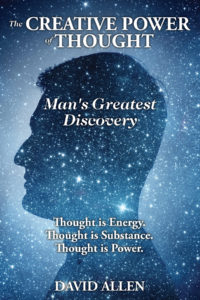“Thoughts,” said Prentice Mulford, “are things.” “Thoughts,” says T. Sharper Knowlson, “so far from being mere brain flashes, are, judging solely from their effects, real entities, apparently composed of spiritual substance, the nature of which is outside the range of discovery of our present faculties.” “Thought,” says Levy, “is not an event which dies in a world ethereal, super-sensible, imperceptible; it has continually its likeness and repercussion in our organism.” “Thought is not,” says Ralph Waldo Trine, “as is many times supposed, a mere indefinite abstraction, or something of a like nature. It is, on the contrary, a vital, living force, the most vital, subtle and irresistible force in the Universe.”
In our very laboratory experiments we are demonstrating the great fact that thoughts are forces. They have form, and quality, and substance, and power, and we are beginning to find that there is what we may term a science of thought.
We are beginning to find also that through the instrumentality of our thought forces we have creative power in reality. Many more authorities could be quoted, but these will suffice to show that thoughts are just as much “things” as town halls or mountains are “things.” It is a great mistake to imagine that because you can see a thing with your physical eyes, feel it with your hands, or hit it with a hammer, that it is for that reason more real than something you can neither see nor feel. On the contrary the “Unseen” is vastly more powerful, lasting and forceful than anything you can see with your physical eyes. What you see with your eyes is only the effect of greater causes which are invisible.
“Everything exists in the unseen before it is manifested in the seen, and in this sense it is true that the unseen things are real, while the things that are seen are the unreal. The unseen things are cause; the seen things are effect. The unseen things are eternal; the seen things are the changing, the transient.”
Thoughts then are “entities,” are things,” are “forces,” are vital subtle “powers.” They, like everything else, and every other force in the universe, are subject to law. This law is the Law of Attraction.
Whatever thoughts you think will attract to you thoughts of a similar nature. According as you create good or bad thoughts, so do you determine whether your life shall be blessed or cursed. If you think a good thought and dwell upon it, and, as it were, nourish it with your meditations, it will not only bless and enrich your life, but will attract hosts of other thoughts of equal power and beauty, which will hasten to minister to you. Thus, if you think “Success” thoughts, and affirm them, and cling to them in the face of apparent defeat and failure, you will attract to yourself such a wave of powerful, upbuilding and inspiring thoughts that you will be lifted right over your difficulty and carried, as by invisible forces, along the path of accomplishment.
On the other hand, it is equally true that if you think a weak thought, a low thought, a vile thought, or a thought of failure, there will be attracted to you a host of thoughts of like character, which by their nature will curse you and drag you down. “Unto him that hath shall be given, and from him that hath not shall be taken away that which he hath” is simply the working of the Law of Attraction. Think “Success” and thousands of invisible forces will fly to your aid. Think “failure” and innumerable forces will help to make your failure even more complete.
If thought is the “greatest power of all powers,” “the most vital, subtle and irresistible force in the universe,” and if your thoughts have the power to attract other thoughts of a like character, then the choice of your thoughts is the most important act of your life.
By choosing your thoughts you choose either success or failure, happiness or misery, health or disease, hope or despair.
Henry Thomas Hamblin
Excerpt From
